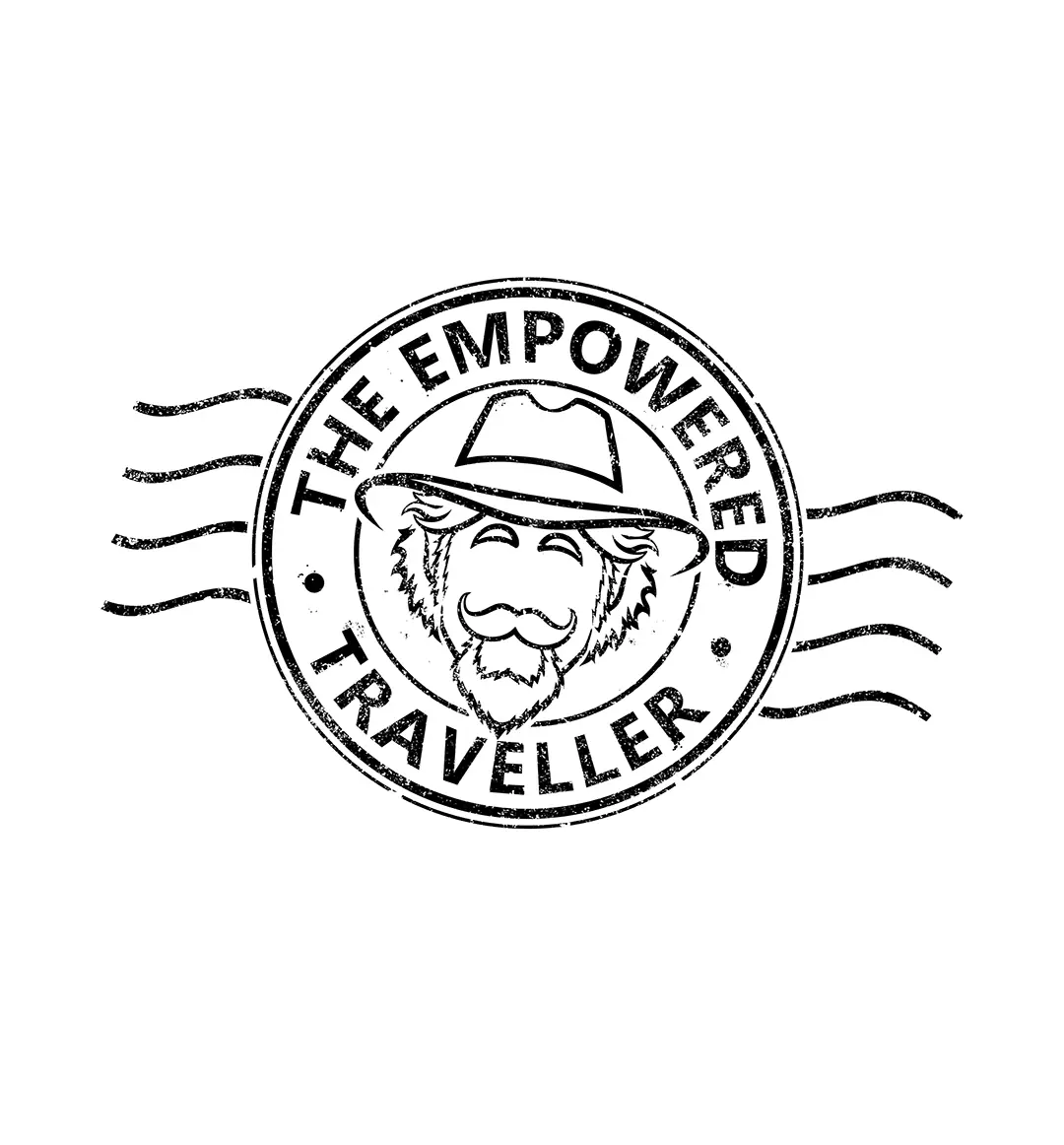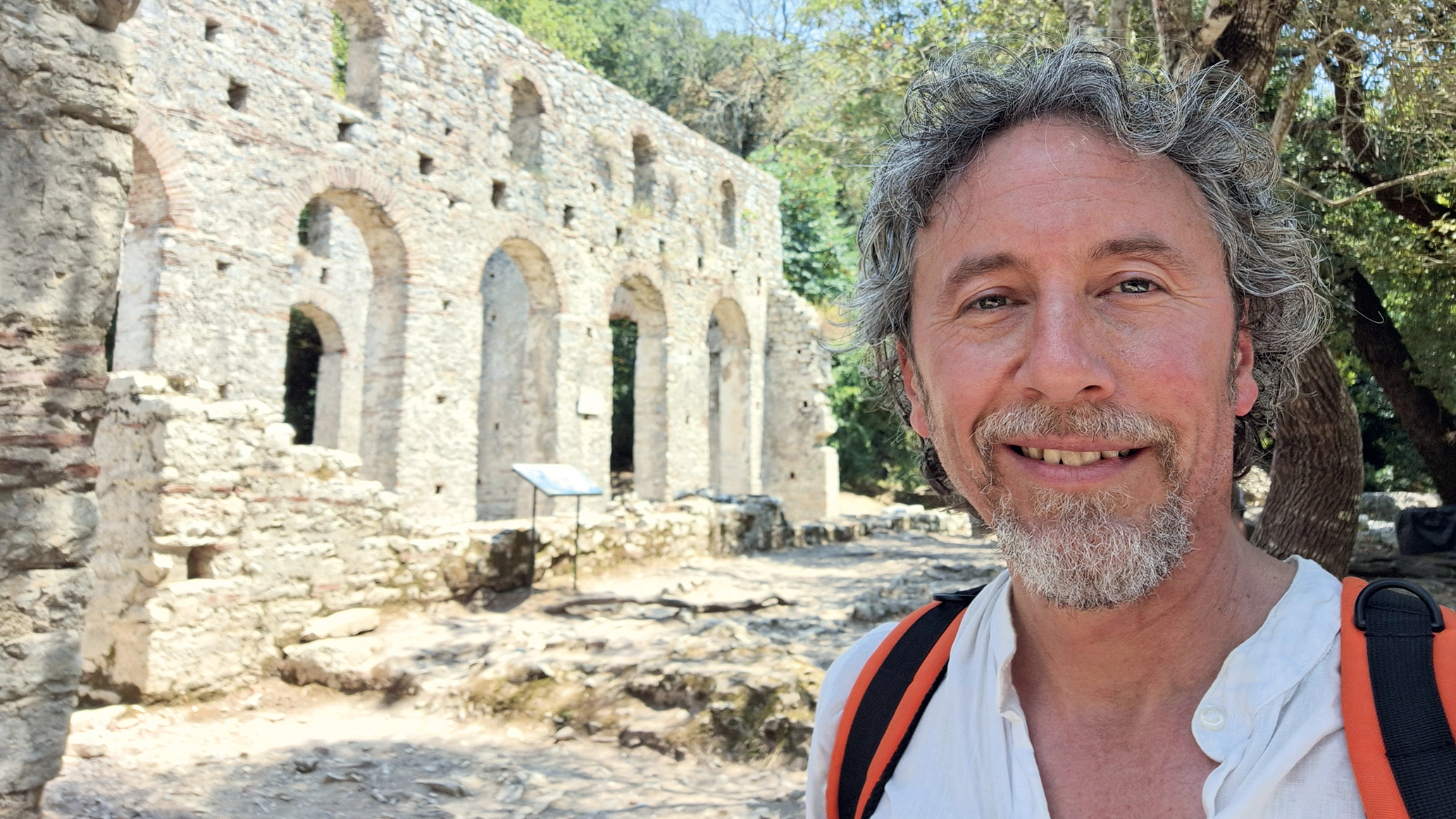Above me loomed the white peak of Whistler Mountain. The 'carpet' ski-lift steadily rolled up the snowy mountainside. I hadn't skied for more than 30 years and thought it was something I'd never experience again. My already racing heart exploded with excitement as I whizzed onto the pine-tree lined Enchanted Forest run in my sit-ski, the crisp air chilling my face and the crystalline snow spray glinting in the morning sun. I couldn't help but let out a joyous "whoop!" I felt free.
As a child, I remember being so excited for our family ski trips. And on summer holidays in Greece and Spain, there was always a story a myth or legend of how someone lived a life different to mine. Travel fascinated me.
Life-changing event
In 1994, at 18 years old, I had an auto-immune response to a virus that damaged the nerve cells in my spine and left me with a paralysed leg. Just at that moment of life where I was trying to work out who I was and how I fitted in, my world changed forever. I tried to adapt as I went along, taking the university route, then working in the hospitality industry and moving into apprenticeship training.
But the one thing I avoided for 10 years was travel. It felt outside my ability to travel on my own, until I took a leap of faith in 2004 and decided to Interrail around Europe. It was just me, my crutches and my backpack. There were innumerable challenges - the internet wasn't really a big thing yet, and I don't think I even had a mobile phone.
But I survived. In fact, I did more than survive - I had an amazing time; the boundaries of my comfort zone had been expanded. I had pushed the limits of my confidence. Yes, there were tough moments, such as spending all night in Florence train station as I had no accommodation, not being able to join in with some of the hostel activities and coming to terms with the edges of my physical capabilities, but I felt wonderful, empowered.

An empowered traveller
It took me another 20 years to make the leap to becoming a travel journalist. With the aid of the amazing Ability Today and The Academy for Disabled Journalists, I embarked on a CFJ (Certificate in Foundation Journalism). I have written for publications such as The Independent, The i Paper, Metro, Adventure.com and Discover Britain, to name a few. I've also started a website, The Empowered Traveller, which aims to provide that extra bit of information people may need to feel confident to book their next adventure.
Viewing things from the perspective of The Empowered Traveller means that I take control of the things that are within my capability, and understand where the challenges may lie. Knowledge is the most important factor in travel, followed very closely by flexibility.
I've shifted how I approach travel, from asking "can I do this?" to "how will I make this happen?" It's surprisingly easy to let limitations define our boundaries, gradually shrinking the world we think we can explore. But when I reframe challenges as puzzles to solve rather than barriers to accept, travel becomes liberating rather than limiting. Things will inevitably go wrong, but I've learned to trust in my ability to adapt and find solutions on the go.
Memorable journeys
In July this year, I returned from Interrailing around Finland. It's probably one of the best countries I've visited for taking accessibility into consideration. Access to trains, trams and public transport was ramped or from a level structure. Low kerbs were the rule as opposed to the exception, and a great deal of the experiences were fully accessible. I went on a hike along the Haukanniemi accessible nature trail, with a guide, Katri, and within minutes felt a million miles away from civilisation, cooking wild mushrooms on a log fire and looking out across a lake with only the rustle of trees, the chirping of birds and the crackle of the campfire surrounding us.
My Motability Scheme car – a Volkswagen Taigo – has also given me the freedom to get around my local area. I recently wrote a piece for a magazine about North Cornwall. I drove along the scenic coast road exploring Boscastle, Tintagel and Padstow, all the way down to Mawgan Porth. It was such a fun, nostalgic trip.

One of the best trips I've had was to British Columbia in December 2024 in advance of the Invictus Games 2025. The facilities in Vancouver and Whistler were second to none. As I mentioned, I hadn't skied since before I was ill but, suddenly, with the help of my trainers at Whistler Adaptive, I was haring down pistes, cross-country skiing and biathlon shooting. I experienced adapted bike rides through Spirit Forest in British Columbia and even got stuck into a game of wheelchair curling. The options in Canada felt almost unlimited.

A sense of adventure
I do have a penchant for more offbeat destinations because they are just so different from my everyday experience. Some of them are unpredictable and the information around them is hit and miss. I love this sense of adventure - not knowing what is around the next corner.
Cote d'Ivoire (Ivory Coast) in May provided many jaw-dropping moments. In Yamoussoukro, the Basilica of Our Lady of Peace was stunning, and is said to contain as much stained glass as all of France put together, while the coastal town of Assinie-Mafia reminded me of the white sand, palm tree-lined beaches of the Caribbean - simply beautiful. One memorable occasion was meeting Nana Kouakou Yao Daniel, the King of the local area, who presented me with a robe, gave me the name Nana Banji and made me an honorary chief. I then accepted greetings from the assembled court!
India is perhaps the most challenging of places. It is a wonderful, colourful and chaotic country, full of vigour and noise. From tuk-tuks in the dusty streets of Delhi to calming canoes in the forested backwaters of Kerala, it is a country of diversity and ingenuity. After breaking one of my crutches in a swamp, I found a street vendor who was only too happy to provide running repairs and refused to take any reward for helping. During my travels, I have also visited garages to fix my calliper and pharmacies for leg stockings and blister protection - and the only reason I know the Italian word for screwdriver (cacciavite) is because of loose screws.

Developments in air travel
There are big changes taking place to improve air travel for disabled people, as not only the moral perspective sinks in but also the appreciation of the community's spending power. But there are still some big challenges. Most planes are not designed with accessibility in mind. Recent media attention has shone a spotlight on these issues and things are slowly improving – such as the addition of low-angled boarding ramps instead of stairs, wheelchair securement systems and Airchairs – but my fear is that until the current plane stock is replaced, changes will be limited.
Countries that are focusing on developing their tourism industry are in prime position to build innovations into their systems. I hope that by continuing to promote accessible tourism, countries such as Albania, Cote d'Ivoire and India can appreciate the real investment they are making by building their travel infrastructure with inclusivity inherent.
Travel has allowed me to grow in confidence and feel far more comfortable in my own skin. It has made me step outside the boundaries that I had created in my head and realise just how much there is to see and do. I can't wait to get to the next destination and find out what conversations I may have in the most unexpected places. Travel is my excitement, and my window to the diversity of the world a place in which I will never be bored.
About Matt
Matt Dennis is a freelance travel writer who also runs accessible travel website The Empowered Traveller. You can also find him on YouTube and Instagram.
Matt's top travel tips
★DO YOUR RESEARCH
A big part of my self-organised trips is research and structuring itineraries. Don't always trust the 'wheelchair' symbol to indicate a fully accessible location. If in doubt, get in touch with a place to discuss your needs.
★BOOK ANY ASSISTANCE YOU NEED IN ADVANCE
If you are booking flights or trains, make sure you book assistance where necessary. Check this is in place a few days before you travel.
★READ DISABLED TRAVELLERS' REVIEWS
Some disabled travellers post about their experiences, which can give you an idea of what to expect. Check out Wheel Around the World with Shane on YouTube. And Scope has a queries posting board.
★BE MONEY WISE
Research countries where public transport is accessible as this keeps costs down. Take some form of disability ID with you often you will get into attractions for free.
★GET COVERED
Take out comprehensive travel insurance that covers your disability and equipment.
★BE PREPARED
Put together a travel health kit with extra medications to last your entire trip, plus extra for delays.
★BELIEVE IN YOURSELF
Finally, don't underestimate yourself. Challenges exist, but solutions do too.
Watch Matt’s video highlights of his recent trip to Costa Rica
Photos: Matt Dennis





